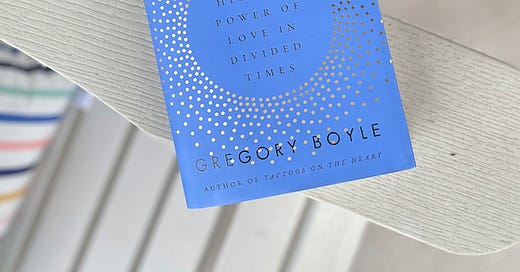According to people who know such things, a sign of a person’s emotional maturity is when they put a halt to their predilection for “splitting,” which is our child-like tendency to decide that a person or situation is either all good or all bad.
Vladimir Putin? Bad.
Mother Teresa? Good.
A woman who stole the candy bar from 7-Eleven? Bad.
A guy who helped an old lady across the street? Good.
We humans seem to feel most comfortable when we can sort ourselves into categories, which in my head look like boxes. It’s safe in our boxes, with people like us, and we want the people who belong in the other box, over there, to stay put where they belong, where we don’t have to look at them.
I was talking about this with my 12-year-old in the car (as one does), and he very assuredly told me that of course it’s better to rather consider that no one on this earth is either all good or all bad. Cian said he has believed this since he was, oh, seven: that everyone is inherently good, and it’s their actions that are either good or bad (Cian, as you might know already, is lightyears ahead of most of us with emotional maturity). Father Greg Boyle, in his new book Cherished Belonging: The Healing Power of Love in Divided Times, proposes that ills like racism or misogyny are illnesses—mental illnesses, even—of unwell people in need of healing and to be made “whole,” and that it’s cherishing people, despite (because of?) the horrors of some of their actions, that will lead all of us on the path to healing. The person, he insists, is always inherently good. Fr. Boyle, like Cian, truly believes a bad action is a symptom, not a declaration—and that our purpose is to care for what’s wounded in the person doing the action in order to understand and heal the part from whence the bad actions spring.
The “othering” is the opposite of who God is. It says there are some folks who don’t belong to us, or they will belong only if they change their behavior…[But n]one of us are healed until all of us are healed. And all of us, to some degree, are not fully whole. I’m certainly not. But surely no one who is well hates.
— Gregory Boyle
Honestly, this all reminds me a lot of David and me when we were first married—we’d gotten married so quickly (not even a year after we met, like a coupla lovesick looney tunes) that so many of our first arguments would spin out of control in our minds because our brains went from “Oh my gad they’re really overreacting to what I said right now” to “Oh my gad my spouse is insane I made a mistake I married the wrong person WHAT DID I DO.” We were too immature to understand the person we picked wasn’t the issue, but some wound or issue we needed to heal. We had to start—and keep—working to understand the reason for the action or reaction, which was separate from the inherently good person in front of us.
But two things happened a couple weeks ago, and they were two things that caused me to “split.” I’ll tell you about them, but there’s one thing to remember here: my 12-year-old is a kid with a heart of gold. Fr. Greg Boyle is a Jesuit priest with such a gift for social justice that he’s been called “ a living saint.” I am neither an idealistic preteen nor kindhearted inner-city world-changer. I, my friends, am just a pissed off writer and mom.
Keep reading with a 7-day free trial
Subscribe to One Vignette to keep reading this post and get 7 days of free access to the full post archives.





